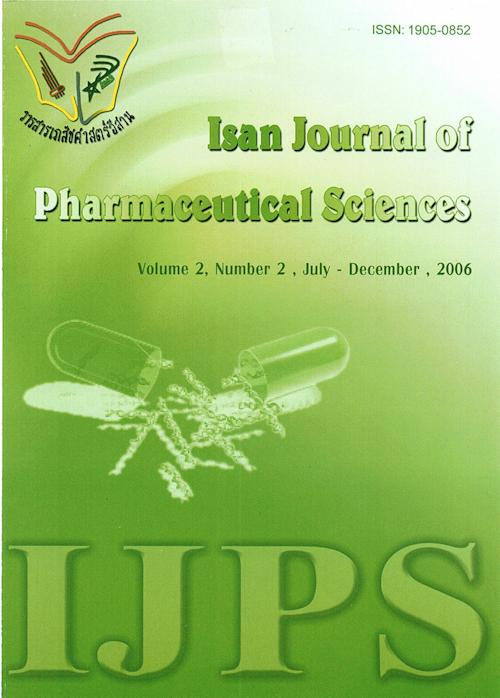Pharmacist Roles in Patients with Acute Coronary Sysdrome in Medical Wards at Srinagarind Hospital
Main Article Content
Abstract
The study of pharmaceutical care in patients with acute coronary syndrome was performed in medical wards at Srinagarind Hospital, Khon Kaen. The aim of this study were to determine the risk of death in coronary artery disease patients, to explore drug related problems and to evaluate patients’ knowledge and drug use behavior before and after received pharmacist’s couseling. This study was a prospective descriptive design, which was undertaken during July 1 to September 30, 2005. There were 24 patients with acute coronary syndrome enrolled in this study. The results showed that most patients (41.18%) were at high level in coronary risk of death. Fifty-five drug-therapy problems were identified from 21 patients and solved by a pharmacist. Most common drug-related problems were poor drug adherence (22 events or 40%), not following instructions for modifying risk factors (12 events or 21.82%) and untreated indication (7 events or 12.73%). Pharmacist solved 45 events and prevented 10 events. Pharmaceutical care improved the knowledge of patients about disease, the drug therapy and coronary risk factors with a statistically significant difference, (p<0.001). In conclusion, pharmaceutical care could help the patients in identifing, correcting and preventing the drug therapy problem in patients with acute coronary syndrome and may improve clinical outcome of the patients.
Article Details
In the case that some parts are used by others The author must Confirm that obtaining permission to use some of the original authors. And must attach evidence That the permission has been included
References
Antman EM, Anbe DT, Armstrong PW, Bates ER, Green LA, Hand M, Hochman JS, Krumholz HM, Kushner FG, Lamas GA, Mullany CJ, Ornato IP, Pearle DL, Sloan MA, Smith sc Jr, Alpert JS, Anderson JL, Faxon DP, Faster V, Gibbons RJ, Gregoratos G, Halperin JL, Hiratzka LF, Hunt SA, Jacobs AK. (2004). ACC/AHA guidelines for management of patients with ST-elevate myocardial infarction—executive summary: a report of the American College of Cardiology / American Heart Association Task Force on Practice Guidelines (Writing Committee to Revise the 1999 Guidelines for the Management of Patients With Acute Myocardial Infarction). Circulation, 110, pp. 588-636.
Braunwald E, Antman EM, Beasley JW, Califf RM, Cheitlin MD, Hochman JS, Jones RH, Kereiakes D, Kupersmith J, Levin TN, PepineCJ, Schaeffer JW, Smith EE in, Steward DE, Theroux p, Gibbons RJ, Alpert JS, Faxon DP, Fuster V, Gregoratos G, Hiratzka LF, Jacobs AK, Smith sc Jr. (2002) ACC/AHA 2002 guideline update for the management of patients with unstable angina and non-ST-segment elevation myocardial infarction-summary article: a report of the American College of Cardiology / American Heart Association task force on practice guidelines (Committee on the Management of Patients With Unstable Angina). J Am Coll Cardiol', 40, pp. 1366-74.
Chinwong S, Reid F, McGlynn S, Hudson S, Eapan A. (2004). The need for pharmaceutical care in the prevent of coronary heart disease: an exploratory study in acute myocardial infarction patients. Pharm World Sci‘, 26, pp. 96-101.
Sud A, Kline-Rogers EM, Eagle KA, Fang J, Armstrong DF, Rangarajank, Otten RF, Stafkey-Mailey DR, Taylor SD and Erickson S. (2005). Adherence to medications by patients after Acute Coronary Syndromes. Ann Pharmaco-, 39(11), pp. 792-797.
Wood D, De Backer G, Faergeman o, et al. (1998). Prevention of coronary heart disease in clinical practice: Recommendations of the Second Joint Task Force of European & other Societies on Coronary Prevention. Eur Heart J, 19, pp. 1434-1503.


